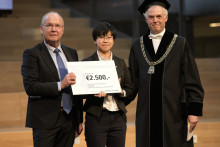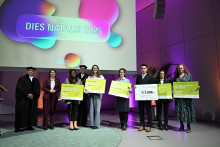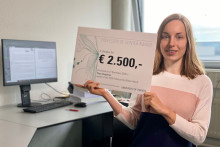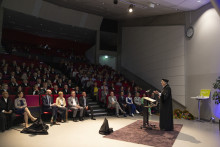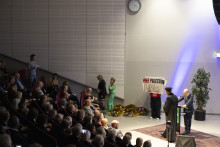Professor de Winter Prize
Professor De Winter Award is an annual prize dedicated to outstanding female talent at the UT. It is named after professor Herman de Winter who was the first dean of the Applied Physics study programme. After he passed away in 2005, his wife Mrs de Winter decided to create a fund in her husband's name. The prize was first awarded in 2007.
The prize amounts to € 2,500 and can we won only by female scientists. It is intended as recognition for excellent research and as a boost for further developing the winner’s career. The award is given to the best international refereed conference paper or international refereed scientific journal written by a female lecturer or senior lecturer.
First in the world
Chuan Li is an Assistant Professor at the Interfaces and Correlated Electron systems group at the Faculty of Science and Technology. She received the prize for her work in the field of topological and superconducting materials. Li was the first in the world to realize superconductivity in ’3D Dirac semimetal’. Her article on the topic was published in a prestigious journal Nature Materials.
This article and the attention it’s drawn within the scientific community was the reason why Li was selected as the 2019 winner. ‘I take this award as a big honor,’ says the researcher. ‘I’m very happy. It is a confirmation of all the work we’ve done here in the past years. Because even though this is an individual award, the work was accomplished by a team. It is a reward for the whole group.’
Quantum computing
Li’s research is mainly fundamental but could have important applications. ‘My research is hard to translate into daily life – for most people nothing will change because of this publication,’ says Li. ‘However, in general my work contributes to finding possible elements for quantum computing. That refers to computers with very high calculation powers that could help solve many problems. And that could completely change everyone’s life.’
Li further explains her work: ‘My research is about combining topological and superconducting materials to study the fundamental physics in topological superconductivity and to build the elemental block of topological quantum computer by making nanodevices out of these materials. We grow some special material, which is called topological Dirac semimetal, and combine it with superconductors in nanodevices. At very low temperature, a special state eventually appears in such devices. We call them Majorana bound states. These states potentially can be used for future quantum computing.’


